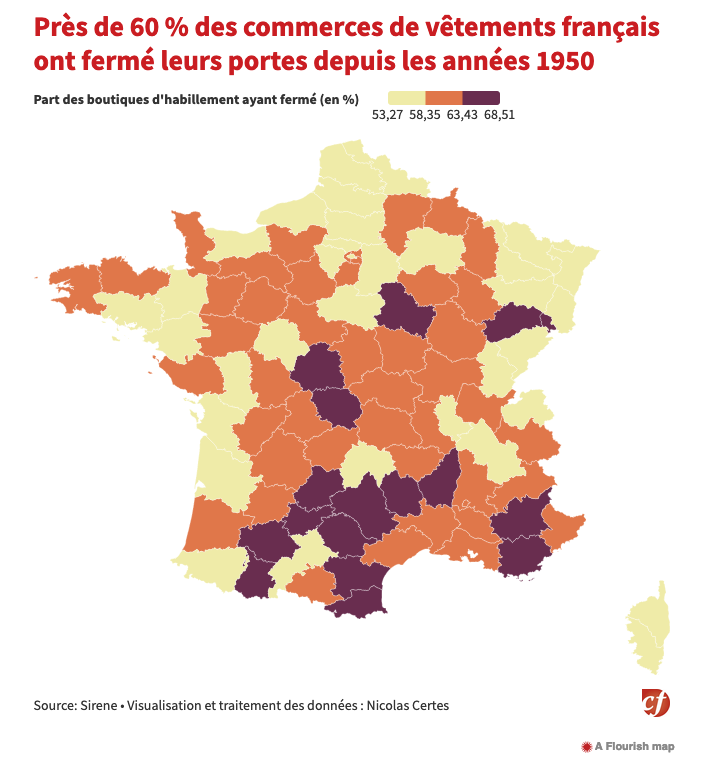
“In town centres all over France, these posters are popping up on the doors of ready-to-wear shops. As the months go by, the list of those shops that are ill or forced to close down continues to grow.
On Wednesday 1 March, the Grenoble commercial court ordered the placement of the Wilsam company, owner of the twenty Gap France franchise shops, into receivership. On 20 February, the San Marina shoe manufacturer was placed in receivership after 42 years of activity, dragging down some 650 employees.
A succession of crises
Since the beginning of the year, André, Go Sport and Kookaï have been placed in receivership. Not to mention C & A, which announced to its French employees the closure of seven shops. And Camaïeu, which was brutally liquidated in September 2022, leaving some 2,600 employees out of work.
Experts are unanimous: the mid-range ready-to-wear industry is suffering the aftermath of four difficult years, between the Gilets jaunes movement, the Covid-19 pandemic and galloping inflation… According to Gildas Minvielle, director of the Economic Observatory of the Institut Français de la Mode, “households have had to revise their trade-offs with inflation and no doubt buy less clothing: when there is an exogenous shock, fashion consumption is not considered essential and this can be understood.”
Hélène Janicaud, Director of Kantar’s fashion division, believes that “the 2022 benchmark is the new standard: shoppers have been buying less since Covid and we won’t go backwards. The proof: in 2022, the turnover of the sector was in decline of more than 4 %, compared to 2019, according to the French Institute of the fashion. A bad situation which should last: eight French people out of ten intend to reduce their expenditure on clothing in 2023, according to a study carried out by the consulting firm Wavestone.
Bad strategy
Observers believe that these shops have not been able to adapt to the evolution of the sector. “The mid-range has already been struggling for several years to find its place between fast fashion, whose giants in the sector are Zara and H&M, and now ultra-fast fashion, embodied by the Chinese newcomer Shein, which sells only on the Internet and whose social and environmental impacts are very heavy,” says Éloïse Moïgno, founder of SloWeAre, an independent label for eco-responsible fashion.
Gildas Minvielle also points to the delay in online sales by these players. “In an almost saturated market, many mid-range brands, instead of developing e-commerce, continued to open points of sale until 2015-2016: this strategy was not the right one.
For Delphine Dion, professor of marketing at Essec and retail specialist, the mid-range clothing sector “has not managed to stay in the wind. These brands have aged and have not managed to ‘connect’ with young people, as new competitors have arrived offering fashion that is very much in tune with their consumption habits (editor’s note: Shein has gained popularity on the social network TikTok, where thousands of videos of people trying on clothes that have just arrived by parcel post) and very cheap. These young people feel that they can become the Kim Kardashian of the social networks thanks to this ultra fast fashion trend. However, Shein raises real ethical and environmental questions by promoting overconsumption and the fashion of the ephemeral. Gildas Mionvielle sums up: “Camaïeu and Kookaï don’t speak to young people. These are brands that their mothers know.
The rise of eco-responsible shopping
In the end, it’s as if the sector was caught between fast fashion and high-end brands, without offering prices as competitive as distributors like Shein or good quality products. “And then to keep one’s desirability in fashion is very hard, except for the luxury brands that have this capacity to rethink themselves constantly.
Finally, more and more people are reducing their consumption for the sake of sobriety and opting for sustainable second-hand purchases. “Since I discovered the appalling figures on the pollution caused by this industry and the monstrous waste that results from it, I only wear second-hand clothes,” says Emilie Gervais, 34, from Le Mans, who shares her ideas for better consumption in a blog.
For Gildas Menvielle, the ready-to-wear sector will evolve towards a more sustainable and responsible consumption. “Companies are trying to move towards less but better. That’s the future. Fashion must undergo a revolution, it is not doomed, even the mid-range. We have to explain that we shouldn’t buy from Shein but from somewhere else, because in the end, we come out ahead, in terms of quality and ethics. But it’s not easy, because the immediate reflex is the price.
Read on the website of La Montagne
